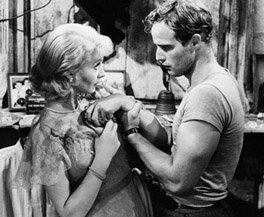Classic Movie Review:
A Streetcar Named Desire
By Josh Spiegel
May 10, 2010
Most people around my age probably think of Marlon Brando as the slightly hammy title character in The Godfather, as a strange and rambling old man from his late appearances on talk shows, or not at all. Brando, who’s been dead for a few years, is best known as one of the great Method performers, from his earlier work in films such as The Wild One and The Fugitive Kind (the latter recently released on DVD from The Criterion Collection). Among his most famous roles are The Godfather, Last Tango in Paris, Apocalypse Now, On the Waterfront, and today’s classic movie, the 1951 adaptation of the Tennessee Williams play A Streetcar Named Desire. In this film, we have one of the most iconic lines and images in all of cinema: Brando, standing in the dark rain, wearing only an undershirt, hands on his head, shouting, “STELLA!”
As with the majority of Williams’ work, A Streetcar Named Desire is set in the South, seemingly at the time of year when the heat is at its most sweltering, and deals with frank discussions of sexuality, manhood, and marital relationships. Brando is Stanley Kowalski, the loutish brute married to Stella DuBois (Kim Hunter, previously of another classic movie highlighted here at BOP, A Matter of Life and Death). Stanley and Stella are welcoming, to their apartment, Stella’s sister, Blanche (Vivien Leigh, once the premier Southern belle from Gone With The Wind). Blanche is visiting her sister thanks to some time off from her work as an English teacher, living in the broken-down plantation that the DuBois family once ruled. Blanche, while being pretty and flirtatious, is also a fragile person who could very well fall apart with one comment.
And the person who’s going to throw in most of those comments is Stanley, whose brutish nature instantly repels Blanche, in the same way that it, fascinatingly, draws in Stella, who is nearly immune to whatever charms he may give off. Still, the back-and-forth between Stanley (who assumes, rightly, that something is very off about Blanche and is unwilling to afford her any charity) and Blanche (who can barely fool her sister, let alone herself) is compelling to watch, even at its most overheated. That said, any issues I have with the film, directed by Elia Kazan and adapted for the screen by Williams and Oscar Saul, stem with the source material, not the performances, all of which are as excellent as they were on the stage (Brando and Hunter reprised their roles, as did Leigh from her time on the West End).
What issues I have are the issues I pretty much have with anything written by Tennessee Williams. Though A Streetcar Named Desire, and most of his other work, has plenty of truth behind it (Blanche has been said to be inspired by Williams’ sister), it feels just a mite ridiculous. I’d say the same about Cat on a Hot Tin Roof, The Glass Menagerie, and the like. Though the common threads that run throughout most of the playwright’s work, including brazen sexuality, homosexual longings, Southern ideals, and so on, are intriguing to discuss, Williams has a habit of presenting these issues in nearly cartoonish fashion. Every character is drawn very broadly, which is why we see so many and easy parodies of the stories (such as the infamous Simpsons musical parody, O Streetcar!).
The performers are all excellent, even as it’s hard not to watch Brando and see the seeds of the over-the-top performances to come later in his career. Even here, Brando’s voice is nothing if not a bit distracting; every time he speaks, it goes all the way from sounding fake to real to fake again. His Method style, while honored by those actors and critics who often throw praise at Brando (and it is deserved, in case you’re getting the opposite leaning from me), is just a bit distracting, especially since it’s so out of vogue these days. Brando’s work here is dominant and forceful, but even he makes things just a little stagey. Considering that the entire point of Method acting (to my understanding) is to make the performances truer and more vital, his Stanley is too outrageous, too much of a lout.
Continued:
1
2

![]() Tweet
Tweet
![]() Print this column
Print this column



